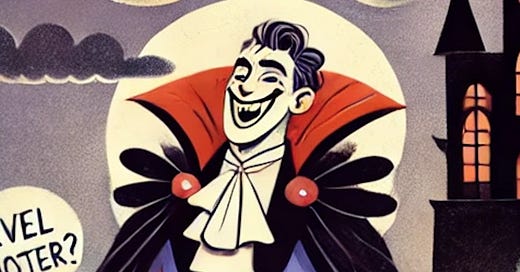Imagine two bad actors.
One bad actor is proudly and loudly so: he boasts about his evil deeds and wicked machinations. He lives in a dark castle on top of the hill near which people keep mysteriously disappearing. Legends say he is an undea—sorry. Got carried away. But you got the vibe: imagine a bad actor that is very legibly so, one of whom you can easily and confidently affirm: “That’s a bad actor”.
What happens to that bad actor? Like, what happens in real life? They’re cut off from their relationships and/or kicked out of all their social groups and/or put in jail and/or killed. That’s what usually happens.
And, why is that? Well, no one cares too much about bad actors or, if anything, they care about them being punished and “getting their due”. Once a bad actor is unambiguously and legibly so, to a whole group, it’s very likely that that group will find it easy to coordinate to punish and/or oust them.
So this is one (imo not very interesting) bad actor.
The other, imo much more interesting, bad actor is the bad actor you’re not sure whether or not they’re actually a bad actor. Maybe they did some sketchy thing, kinda?, or, for some reason the vibes around them are “off”, or, I don’t know man, I just feel uncomfortable around them… But my friend swears by them and maybe I am being unfair and am I judging people too harshly?
This type of bad actor that I find more interesting is the ambiguous bad actor, the “Schrodinger’s cat” bad actor. You suspect that they might be a bad actor. But you. just. don’t. know. They make you doubt your own judgment.
And if you can’t get to inner quorum about whether they’re bad or you’re being paranoid/insane then certainly your community can’t either, which makes coordinating action against them much harder.
Now, you may see how it follows that if there are two types of bad actors—one that is good at hiding and one that isn’t—and if communities are successful at ousting the ones who are good at hiding then the only remaining bad actors are going to be bad actors who are good at hiding the fact that they’re bad actors.
It follows, and it is horrifying. Agreed on both accounts.
But enough blackpilling: how do you actually deal against this? Well, here’s one way I’ve seen work: communication. Fr.
The ambiguous bad actor specializes in acting in a way that has just enough plausible deniability, that has just enough subtlety, to make you doubt your own judgment.
However, it’s much harder to doubt your judgment when everyone around you independently arrives on the same judgment.
Like, ok, it’s just “being creeped out” but if literally everyone who’s alone with this person in a room for more than 5 minutes comes out of it feeling “creeped out” then maybe there’s a there there and it’s not everyone having a mass hallucination.
Which is why this type of bad actor often cuts horizontal communication, either directly, cutting comms between people, or indirectly, by operating in many non-overlapping communities, or keeping the people they know from meeting, or or or.
What I’m saying here is one of the ways to defend against those that specialize in subtlety is to get together with others to triangulate. Or, in everyday language: to debrief.
So debrief! Loudly and proudly* :)
*But not so loudly and proudly that ambiguous bad actors are themselves present in your debriefs. :))))))




There should also be some maximum "depth" of hiding one's bad intentions. After reaching that depth, it will always be harder to conceal the evil truth rather than turn oneself to the good side.
More gossip. Got it!